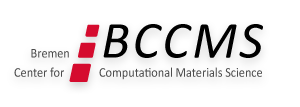Download:
Program of the International CECAM-Workshop
Correlated electron physics beyond the Hubbard model
Bremen Center for Computational Materials Science - BCCMS
University of Bremen, February 4th - February 8th 2019
Monday, February 4th 2019 (Radisson Blu Hotel Bremen) | ||||
18:00 | – | 21:00 |
| Arrival and Registration |
Wednesday, February 6th 2019 (House of Science Bremen, Downtown) | ||||
Session: |
| Coupled cluster, FCIQMC and related quantum chemical | ||
|
|
|
| Chair: Philipp Werner |
09:00 | – | 09:40 |
| Lucas K. Wagner, University of Illinois at Urbana-Champaign, |
09:40 | – | 10:20 |
| George Booth, University of Cambridge, United Kingdom |
10:20 | – | 10:50 |
| Coffee Break |
10:50 | – | 11:30 |
| Silke Biermann, Ecole Polytechnique, Palaiseau, France |
11:30 | – | 12:10 |
| Tianyu Zhu, California Institute of Technology, Pasadena, California, USA |
12:10 | – | 13:50 |
| Lunch Break (Restaurant Q1) and Coffee |
Session: |
| Constrained many-body perturbation theory, density functional theory and related methods I | ||
|
|
|
| Chair: Shan-Wen Tsai |
13:50 | – | 14:30 |
| Matteo Cococcioni, Swiss Federal Institute of Technology, Lausanne, Switzerland |
14:30 | – | 15:10 |
| Ferdi Aryasetiawan, Lund University, Sweden |
15:10 | – | 15:50 |
| Malte Rösner, Radboud University, Nijmegen, The Netherlands |
15:50 | – | 16:20 |
| Coffee Break |
16:20 | – | 17:00 |
| Ryotaro Arita, University of Tokyo, Japan |
17:00 | – | 17:40 |
| Malte Schüler, University of Bremen, Germany |
17:40 | – | 18:20 |
| Round Table Discussion |
18:40 |
|
|
| Bus Pickup to Conference Dinner (Radisson Blu, Wachtstraße) |
19:00 | – | 22:30 |
| Conference Dinner (Restaurant Juergenshof) |
Thursday, February 7th 2019 (House of Science Bremen, Downtown) | ||||
Session: |
| Lattice Quantum Monte Carlo | ||
|
|
|
| Chair: Johannes Lischner |
09:00 | – | 09:40 |
| Stefan Wessel, RWTH Aachen University, Germany |
09:40 | – | 10:20 |
| Thomas Devereaux, Stanford University, California, USA |
10:20 | – | 10:50 |
| Coffee Break |
10:50 | – | 11:30 |
| Andrew Millis, Flatiron Institute, City of New York, New York, USA |
11:30 | – | 12:10 |
| Sandro Sorella, International School for Advanced Studies (SISSA), Trieste, Italy |
12:10 | – | 13:50 |
| Lunch Break (Restaurant Q1) and Coffee |
Session: |
| Diagrammatic Monte Carlo | ||
|
|
|
| Chair: Ryotaro Arita |
13:50 | – | 14:30 |
| Boris Svistunov, University of Massachusetts Amherst, Massachusetts, USA |
14:30 | – | 15:10 |
| Nikolay Prokofiev, University of Massachusetts Amherst, Massachusetts, USA |
Session: |
| Functional Renormalization Group | ||
15:10 | – | 15:50 |
| Sabine Andergassen, University of Tübingen, Germany |
15:50 | – | 16:30 |
| Shan-Wen Tsai, University of California Riverside, California, USA |
17:25 |
|
|
| Poster Mounting |
17:30 | – | 21:00 |
| Poster Session + Catering Buffet (House of Science) |
Friday, February 8th 2019 (House of Science Bremen, Downtown) | ||||
Session: | Constrained many-body perturbation theory, density functional theory and related methods II | |||
|
|
|
| Chair: Tim O. Wehling |
09:00 | – | 09:40 |
| Carsten Honerkamp, RWTH Aachen University, Germany |
09:40 | – | 10:20 |
| Alexander Steinhoff, University of Bremen, Germany |
10:20 | – | 10:50 |
| Coffee Break |
10:50 | – | 11:30 |
| Mark van Schilfgaarde, King’s College London, United Kingdom |
11:30 | – | 12:30 |
| Concluding Round Table Discussion |
12:30 | – | 12:45 |
| Closing words and Departure |
